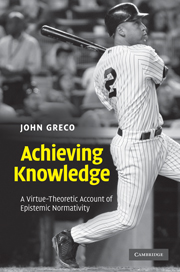2 - Against deontology
Published online by Cambridge University Press: 05 June 2012
Summary
Virtue theories in ethics are often presented as an alternative to deontological theories such as Kant's. One important issue here concerns the existence of moral rules and their relation to moral action. Specifically, it is commonly claimed that it is an advantage of virtue theories that they do not commit us to moral rules. The reason this is an advantage, it is argued, is that it is unclear whether such rules play any important role in our moral lives. In this chapter I want to argue in a similar way with respect to theories of knowledge. In particular, I want to argue that a virtue-theoretic account of knowledge holds an advantage over a deontological approach, and precisely because the former need not understand epistemic normativity in terms of rules or norms. A few comments will clarify this thesis.
First, William Alston has argued that there are a variety of “epistemic desiderata.” In Nicholas Wolterstorff's terminology, there are a variety of “truth-relevant merits.” In this chapter, and throughout this book, I am interested in the sort of “merit” that is required by knowledge. In other words, I am interested in what I have been calling “epistemic normativity.” It might be that deontological theories adequately capture some other kind of truth-relevant merit, or some other kind of epistemic desiderata. The thesis here is that deontological theories cannot give an adequate account of epistemic normativity, or the sort of normative status that is required for knowledge.
- Type
- Chapter
- Information
- Achieving KnowledgeA Virtue-Theoretic Account of Epistemic Normativity, pp. 17 - 46Publisher: Cambridge University PressPrint publication year: 2010



